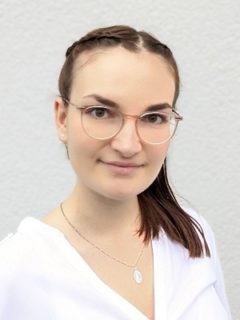Maren Fiedler
Maren Fiedler
Former master student
Assessment of Different Collagen-Based Bioinks to study Tomor angiogenesis in a 3D-Printed Breast Cancer Model
Supervisors: D Dr. Annika Kengelbach-Weigand (University Hospital Erlangen), Prof. Dr. Andreas Arkudas (University Hospital Erlangen), Prof. Dr. Aldo Boccaccini (Institute of Biomaterials),
As it is the main component of the human extracellular matrix, collagen type I is a suitable component for the creation of a bioink to 3D bioprint organs and tissues [1]. In this study, in collaboration with the University Hospital Erlangen, said structural protein will be combined with spheroid-encapsulated human umbilical vein endothelial cells, to mimic the breast cancer microenvironment. Due to its low mechanical properties, collagen has proven difficult to 3D print [2], which is why the freeform reversible embedding of suspended hydrogels (FRESH) [3] method will be applied, and varying concentrations of hyaluronic acid will be added to fabricate different bioinks. To assess the efficacy of said model, the printed material will be characterized, and the angiogenic potential of the encapsulated cells will be evaluated.
[1] Stepanovska, J., Supova, M., et al., Collagen Bioinks for Bioprinting: A Systematic Review of Hydrogel Properties, Bioprinting Parameters, Protocols, and Bioprinted Structure Characteristics, Biomedicines Vol. 9 (2021), 1137.
[2] Włodarczyk-Bieguna, M. K., del Campo, A., 3D bioprinting of structural proteins, Biomaterials Vol. 134 (2017), 180-201.
[3] Lee, A., Hudson, A. R., et al., 3D bioprinting of collagen to rebuild components of the human heart, Science Vol. 365 (2019), 482-487.

